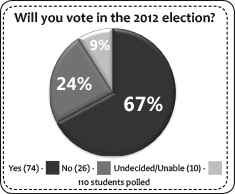By Natalie Goodwin
American voters have advertisements coming at them every day, trying to influence how they vote. Both endorsements and attack ads run nonstop in the media. Signs are practically in every other yard.
Along with the encouragements that bombard us from signs, television and radio, persuasion and perception have an impact on how we vote.

According to a US Census Bureau report, 49 percent of voters aged 18 to 24 exercised their right to vote in the 2008 elections. Sophomore Shelby Wheat said she does not support either party or presidential candidate so she is choosing not to vote in the upcoming election.
“It is not the party I would vote for, it is the individual, what I think of the candidate themselves,” Wheat said. “I pay close attention to their platforms and what issues they claim they will address while in office. I do not let slanderous commercials weigh much on my opinion. I think politics should be more about the people and less about mudslinging.”
Wheat said the low voter turnout in her age group in 2008 would not affect her decision.
“I still feel my voice will not be heard,” she said. “Any party besides the Democrats and the Republicans do not get the same amount of media attention. Parties that do not have enough money to campaign or compete will not win, pretty much David versus Goliath, but in America the little guy, or the one with less money, cannot win.”
Wheat said she feels her vote will be “lost.”
“However, I do feel since my generation will soon be the adults of the world that maybe, in the future, my peers will have more say-so, with a viable, independent candidate,” she said.
Freshman Ashley Jagow, 18, will be a first-time voter in the 2012 elections.
“This is the first year I can legally vote, so I feel that I need, as a young American, to cast my vote on the future of the country I live in,” Jagow said. “I feel society encourages people who become of age to vote.”
Jagow said she believes it’s partially an obligation to vote but more importantly she should have a say in who runs her country. She has already decided who she plans to vote for but is not supporting a specific party.
“I have not chosen a permanent party affiliation; I intend to always vote for the individual and not a specific party,” she said. “My vote will go against my entire family, at least in this election. Who knows how I will vote next time? It will all depend on the nominees as a person, what each of them stands for.”
Toby Klinger, professor, Psychology, made several observations about what impacts our vote.
“It seems as though you’ve got to have an enemy,” she said. “You are more than likely to get people to vote if they think one’s the bad person and the other one is a nice one.”
Klinger also said even though there are negative ads, “if you have already made up your mind it would take an awful lot of to change your mind between candidates. It would take a lot of smut to make you alter your point of view.”
She continued, “In several lines of research you will find the neurocognitive people pointing out that people do not vote necessarily out of logic or reason but gut reactions or how it emotionally triggers off parts of the brain.”
Klinger suggested negative campaign ads may work because of that reason and feels it is an interesting line of research. Some literature makes the point that it is not necessarily rational reasons why we vote but may be part of egocentrism.
Klinger said she feels family definitely plays a role in a voter’s point of view.
“Especially family culture; there is something about personality and how we are brought up that may affiliate us with a party,” she said. “People tend to go with what they were raised in.”
Klinger said she intends to vote, and people should know they do have a voice and can create change.
Come November, some voters will choose to go with what they have learned at home. Some might just go by campaign ads, signs, or what they learn from the media. Some will not vote at all, feeling their vote won’t matter because they are not supporters in the major parties.
For more information or to register to vote in Johnson County, visit http://www.jocoelection.org.
Contact Natalie Goodwin, reporting correspondent, at [email protected].
Related article: Voting where it counts
Related column: Column: Voting, an American duty





















